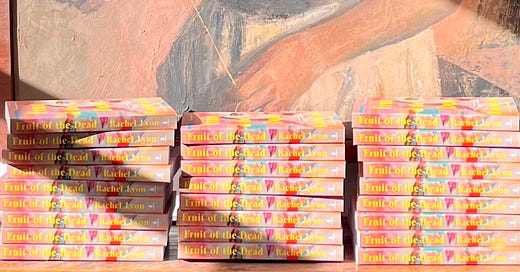A Final Countdown
Book promotion in an apocalypse, as the FRUIT OF THE DEAD life cycle enters its final stage.
It’s a real exercise in nihilistic absurdism, promoting a book in (what feels like) an apocalypse. For the sake of efficiency, I’m going to put the bulk of what I have to say here below the following news: FRUIT OF THE DEAD: The Paperback! comes out on 2/4/25. I have a big stacks of these pretty babies in my office here. I’d love to give you one—especially if you’ve already read the book and would like to give it to someone else as a gift.
Be one of the first 10 people to enter your address in the form below, and I will mail you one of these very copies, inscribed to the recipient of your choice. (All your info will stay private.)
I have been thinking a lot, lately, about social media. Particularly the constant dialogue therein about catastrophe. It goes without saying that social media facilitates and multiplies knee-jerk reactions, finger-pointing, lies, and bad ideas. That it also intensifies and perpetuates discourse around our worst and most relentless catastrophes plunders our mental and emotional resources, which at once numbs us to the pain of others and/or destroys our ability to compartmentalize.
Like so many, I have fretted and wept in the car and lost sleep about the inconceivable wreckage wrought by the recent and ongoing fires in Los Angeles. The violent suddenness, the magnitude of loss. The immeasurable, bewildered grief. But I have become allergic in recent months (or couple years? since perhaps the war in Gaza?) to posting about catastrophe on social media. I am confused by the social pressure that encourages us to add our voice to the echoing, discordant multitude.
What would I be posting for, I wonder? Surely not for the victims. If it can be cathartic to participate in a kind of communal outpouring of grief, the line between authentic sympathy and virtue-signaling is awfully murky. I have come to feel that my own emotional reactions, my own inexpert perspectives, are exactly as valuable to the world at large as “thoughts and prayers.” As for links to aid organizations and accurate, up-to-date information, plenty of activists and journalists are already spreading the word far better and wider than I ever could.
In a recent Substack piece, contextualizing an upcoming year-long break from social media, the novelist Edan Lepuki wrote, “The war-to-vacation photos whiplash is already challenging, and I can’t abide the notion that posting about an atrocity is a political action—or that, by not posting you are complicit in this or that atrocity.” The presumption that online silence is complicity feels not just wrong to me but possibly dangerous and probably inappropriate.
Wrong, often literally, because the majority of us are not journalists and do not/ cannot adequately fact-check our information before sharing it. Wrong, morally, because you cannot know what a person is doing behind closed doors, or on CashApp. To help someone anonymously is the highest form of tzedakah. To broadcast one’s charity publicly can seem cheap and thirsty.
It feels dangerous, long-term, because while our first amendment rights may still be protected now, in the last shallow gasps of the Biden administration—albeit on some private company’s social platform, with its dubious security, purchasable surveillance, and artificially intelligent, evolving algorithms—as a citizen, a novelist, or consumer of even the lightest dystopian content, one cannot help but wonder what kind of consequences could await the armchair social media activist who publicly opposes future administrations.
Lastly, that “silence = complicity” might apply to passivity online feels inappropriate—if not misappropriated—because, I suspect, the very idea has been decontextualized completely from its origins. It is one thing, say, to publicly shame an organization for some corruption, sign a petition, or amplify a group or individual working to effect real change. It is another to direct one’s rant into the echo chamber. Not only is it useless; not only do the platform’s algorithms evolve quicker than we do to silence those who speak out publicly against oppression; but, also, the dopamine rush of simply posting about the thing can trick us into feeling as if we took some action. To merely post is to talk the walk.
In terms of my own online dialogue around catastrophe, I have come to believe that, personally, I can offer approximately three categories of value: amplification of actual experts; love; and money. (Allow me to direct you to this recent post by the profoundly reasonable LA-based writer Pri Mattoo.) Privately, I donate; I catastrophize; sometimes I cry. Publicly my vibe is more: check out this psychedelic Play-Doh hot dog.
And, you know, after posting a picture of said hot dog in my Stories, I heard from a friend in LA who saw the photo and wrote to say that, in fact, despite or because everything is so deeply frightening right now, it kind of helped. We all play different roles, and while not all of those roles have equal value, they can all be precious, even in some fleeting, minor way.
Perhaps someday soon I will follow Lepuki’s lead and—particularly in the wake of Meta’s despicable and cowardly new policy announcement—leave Instagram for a year or even forever. Perhaps I already would have, were it not for the increased, increasing value to me of exchanges like the above. Had I not become a mommy hermit in the howling woods with two maniac children for most of her company, for whom each small hangout and correspondence, digital or otherwise, can feel almost holy. Had I no book to promote for a while.
For now, however, I have this one, small happy thing: that FRUIT OF THE DEAD has entered its final stage of the publication life cycle. The psychedelic Play-Doh hot dog of good news.
Events
If you’re in the NYC area, please join me at a reading and launch party to celebrate the paperback release of FRUIT at P&T Knitwear on Tuesday, February 4. The lineup—Essie Chambers (SWIFT RIVER), Crystal Hana Kim (THE STONE HOME), Nayantara Roy (THE MAGNIFICENT RUINS), and Lena Valencia (MYSTERY LIGHTS)—will be terrific. Will I wear sequins? Will we go out afterward, like child-free grown-ups without a care in the world? Come find out.
If you’re NYC-based but can’t swing the above, come to Franklin Park the following Monday, 2/10, where I’ll join another excellent lineup, including Jessica Hoppe, Anelise Chen (CLAM DOWN: A METAMORPHOSIS), and Sarah Perry (SWEET NOTHINGS), at the paperback launch event for Leslie Jamison’s SPLINTERS.
If you’re Eastern Massachusetts, say hello at Porter Square Books on Tuesday, 2/11—
Classes
—and if you’re in Western Mass, consider dropping in on one of the last two sessions of my creative writing class, currently meeting Wednesday evenings from 6:30-8PM at Belding Memorial Library (through 1/29). The people are lovely, the vibe is cozy, the readings are excellent, and the prompts are pretty fun, I think.
I will be teaching a new craft course on time in fiction for One Story this March. The four-week class is an expanded, virtual version of a one-day master class I taught to MFA students at the Kent University Paris School of Arts and Culture this past October. We’ll be looking at short stories by Ted Chiang, Lorrie Moore, Justin Torres, and others, and craft essays by the likes of Joan Silber and Kevin Brockmeier. I think it will be great. Sign up here.
In Other News
A long and generous review of FRUIT OF THE DEAD appeared in this season’s issue of The Georgia Review.
Happily, FRUIT was also a Goodreads Editors Pick and named a best book of 2024 by the nice people at Oprah Magazine, British GQ, Write or Die, Lit Girl, and So Many Damn Books, among other publications.
And I just saw this week that Pravesh Bhardwaj included my story “The Fragrant Conscious World,” published in the winter 2024 issue The Bennington Review, among very good company in his 10 Outstanding Stories To Read in 2025 in Longreads. If you’re looking for something to read, there’s a lot out of wonderful stuff still out there which has been through the rigorous content moderation process that is publication.
Yours,
Rachel







